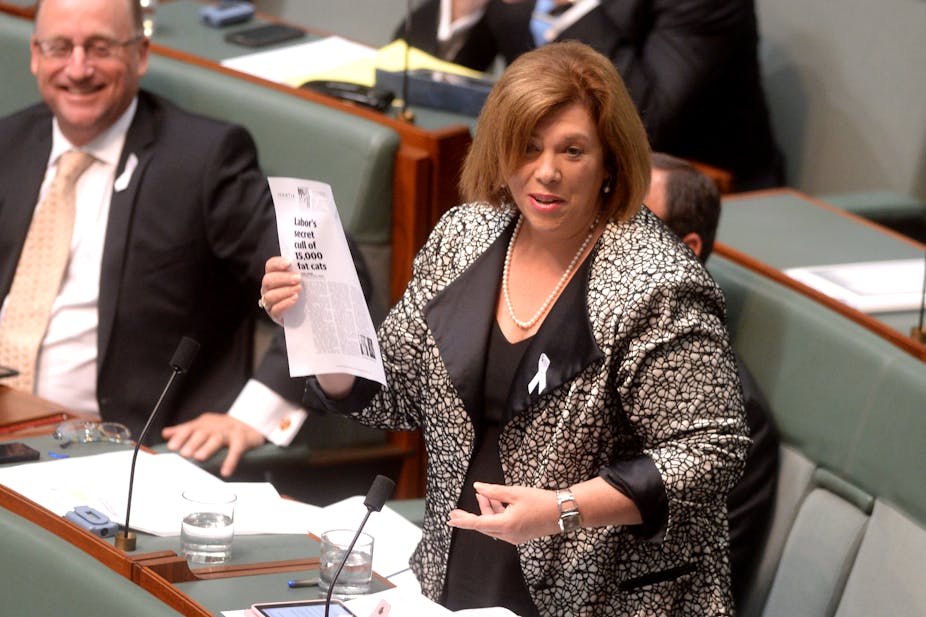Liberal MP Teresa Gambaro, one of the sponsors of the cross-party private member’s bill to be introduced on Monday, has declared that on same-sex marriage “party political positions should be abandoned in favour of what each person’s conscience tells them”.
In a strongly worded opinion piece, Gambaro writes that “for me, as a Liberal member of parliament, that would be democracy in its purest form”.
This flatly contradicts the Coalition’s position.
Queensland Liberal Warren Entsch will introduce the bill on Monday. It is seconded by Labor’s Terri Butler. Entsch is proceeding with the bill despite the Coalition partyroom deciding against a free vote on same-sex marriage this term, and Tony Abbott indicating the bill will not be allowed to come to a vote.
Abbott has promised a popular vote – either a plebiscite or a referendum – in the next parliamentary term and says the issue should be the people’s choice. But earlier he encouraged Entsch to seek support for a cross-party bill and said the matter was one for parliament.
A Fairfax-Ipsos poll taken between Thursday and Saturday has found 69% in favour of legalising same-sex marriage and only 25% against.
Gambaro writes: “This issue is bigger than the individual opinion of one man or woman. If the Australian people through their representatives in the parliament vote against same-sex marriage, while I may not agree with that position, I would accept their decision.”
Gambaro stresses she is a “happily married straight woman” whose support for same-sex marriage is based on her belief that this is what a majority of her constituents in her seat of Brisbane want and her personal view that all people, whether gay or straight, are entitled to make their choice for themselves.
Gambaro voted against change in 2012 because she believed that was consistent with assurances she had given before the 2010 election and that this position accurately reflected the majority view in her seat at the time.
“After this election, I surveyed my electorate and found 70% of respondents were in favour of same-sex marriage. During the 2013 federal election campaign, many people wanted to know what my conscience vote would be on the issue of same-sex marriage. At that time the prime minister also gave an undertaking that any vote on same-sex marriage would come before the Coalition partyroom for consideration in this term of parliament,” Gambaro writes.
“It is the nature of human experience that views change over time.”
Many people had sought to advise her on the basis of what was “either a politically expedient or so called acceptable position to take. My response to that advice now is as it was then – I will not be bullied into one position or another and I believe in representing people properly, not using them for a political purpose.”
Gambaro says she is very proud the bill was drafted in her office. “But it is the bill’s cross-party support that is its most important feature and is what distinguishes it from previous bills.”
Securing cross-party support “was the crucial first step necessary to give the parliament, as the people’s house, ownership of this issue”.
The bill provides “absolute protection of religious freedom in that it does not compel ministers of religion or chaplains to undertake same-sex marriages where to do so would contravene the tenets of their faith”.
If marriage is a statement of commitment made by two people to the world about their love, “why does it matter whether those two people be Ted and Barry or Emily and Rosie?
"Sadly, I think this is because many of us see marriage as a status symbol of moral superiority as opposed to the simple statement of love that it is meant to be.”
The crux of the matter is freedom of choice – “a person’s choice to get married does not belong to me, it does not belong to government and it is not for political parties”.
Gambaro rejects the argument put by some Coalition objectors, including Nationals deputy leader Barnaby Joyce and government Senate leader Eric Abetz, that changing the law could affect relations with Asia. New Zealand has not suffered negative fall out, she points out.
“The United States does not appear to be concerned about the possibility of any negative fallout from the appointment of John Berry, who married his partner Curtis Yee in August 2103, as the US ambassador to Australia. Mr Berry’s appointment does not appear to have damaged US-Australian trading relations or resulted in the dissolving of the ANZUS treaty.”

